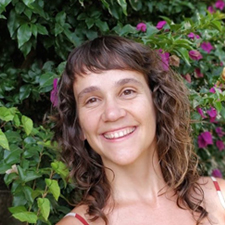I was born in Madrid and I live in Linares de la Sierra, a town in the Sierra de Aracena (Huelva, Spain). I have never been very clear about whether I am more into social sciences or into natural sciences, but I have always been fascinated, while concerned, about the relationships between social systems and the ecosystems that support them. I stepped into research after studying a Bachelor in Biology and doing my BSc thesis on ecological footprint and sustainability of Mediterranean wetlands. During my Master in Ecology at the Autonomous University of Madrid I came in contact with Sustainability Sciences, and I developed my MSc thesis around a critical meta-analysis of monetary valuations of ecosystem services in Mediterranean wetlands and forests. It was with my PhD Thesis, also at the Autonomous University of Madrid, when I met transhumant pastoralists and got fascinated by livestock farming, pastoralism and agroecosystems. Since then, I am interested in the functioning of social-ecological systems, especially agro- and silvopastoral, and their resilience, as well as local / traditional ecological knowledge. I have worked as a postdoctoral researcher at the University of Córdoba, the Pablo de Olavide University of Seville, the University of Wageningen (Holland) and the University of Copenhagen (Denmark), and I am currently part of the Chair on Agroecology and Food Systems of the University of Vic, thanks to a “Juan de la Cierva – Incorporation” fellowship.
My research lines include the socio-cultural assessment of ecosystem services and associated trade-offs and power relations, the analysis of social networks of mutual support and local / traditional ecological knowledge, the study of history and socio-ecological resilience, participatory design of future scenarios and the proposal of adaptive co-management systems, especially in communal areas. I work from the perspectives of political agroecology and participatory approaches oriented to action, trying to incorporate a gender perspective in my work. Lately I have been particularly interested in the role of new emergent peasantries and women in agroecological transformation, particularly in pastoral systems.
My research activity is intertwined with an active participation as an activist in social movements such as Ecologistas en Acción, la Plataforma por el Pastoralismo y la Ganadería Extensiva, the Spanish ICCA platform iComunales and Tramallol. I cannot understand my life without collaborative work, laught, good food and cooking in company, but above all I could not live without incorporating other languages into my day to day life, especially contemporary dance and Contact Improvisation.
FRACTAL is for me the crystallization of a collective identity of young women researchers, a network of mutual support, of collaborative learning and cooperative work that supports us based on the principles of strong sustainability, social-ecological justice and feminism.
Publicaciones
- Oteros-Rozas, Elisa, Federica Ravera, and Marina García-Llorente. 2019. “How Does Agroecology Contribute to the Transitions towards Social-Ecological Sustainability?” Sustainability 11 (16): 4372. https://doi.org/10.3390/su11164372.
- Oteros-Rozas, Elisa, Adriana Ruiz-Almeida, Mateo Aguado, José A González, and Marta G Rivera-Ferre. 2019. “A Social-Ecological Analysis of the Global Agrifood System.” Proceedings of the National Academy of Sciences of the United States of America. https://doi.org/10.1073/pnas.1912710116.
- Mastrángelo, Matías E., Natalia Pérez-Harguindeguy, Lucas Enrico, Elena Bennett, Sandra Lavorel, Graeme S Cumming, Dilini Abeygunawardane, et al. 2019. “Key Knowledge Gaps to Achieve Global Sustainability Goals.” Nature Sustainability. https://doi.org/10.1038/s41893-019-0412-1.
- Delgado-Serrano, M. M., E. Oteros-Rozas, I. Ruiz-Mallén, D. Calvo-Boyero, C. E. Ortiz-Guerrero, R. I. Escalante-Semerena, and E. Corbera. 2018. Influence of community-based natural resource management strategies in the resilience of social-ecological systems. Regional Environmental Change 18(2): 581–592.
- Oteros-Rozas, E., B. Martín-López, T. Daw, E. Bohensky, J. Butler, R. Hill, J. Martin-Ortega, A. Quinlan, F. Ravera, I. Ruiz-Mallén, M. Thyresson, J. Mistry, I. Palomo, G. Peterson, T. Plieninger, K. Waylen, D. Beach, I. Bohnet, M. Hamann, J. Hanspach, K. Hubacek, S. Lavorel, and S. Vilardy. 2015. Participatory scenario-planning in place-based social-ecological research: insights and experiences from 23 case studies. Ecology and Society 20(4):32.
Proyectos
- ENVISION – An inclusive approach to assessing integrative scenarios and visions for protected area management. Biodiversa – Belmount Forum 2019-2022.
- TRASCAR – Global change, socioecological systems and movement ecology: a large-scale spatial approach to the role of grazing systems climate and scavenging processes. MINECO 2019-2022.
- INSPIRA TERRITORIO – Dianmización de un sistema agroalimentario territorializado en la Sierra de Aracena. Fundación Carasso 2020-2021.
- SPG – sistemas de confianza, producción ecológica y garantía. Innovaciones sociales al sello oficial en el contexto de los canales cortos de comercialización de alimentos ecológicos. MINECO 2018-2020.
- REVERDEA – Navegando el continuum rural-urbano desde una perspectiva socio-ecológica. Andalucía Talent Hub, Sistema Andaluz de Conocimiento – Marie Curie IF de la UE.

